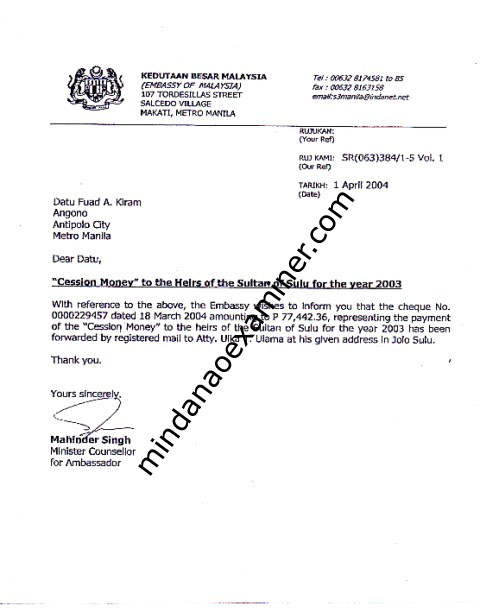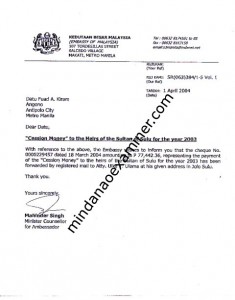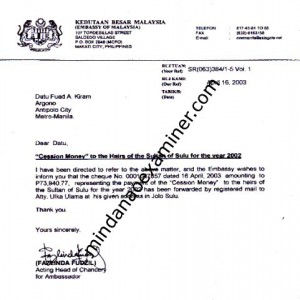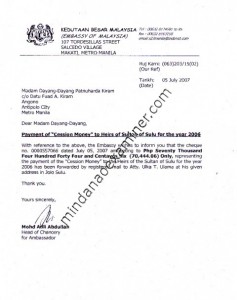
ZAMBOANGA CITY (Mindanao Examiner / Mar. 10, 2013) – “Pajak,” a term which means “lease” is what the Sulu Sultanate gets from Malaysia, but Kuala Lumpur says it is “cession” money as payment for North Borneo, which is being claimed by both sides as theirs.
Now called Sabah, the oil and mineral-rich island, just several hours by boat from the Filipino province of Tawi-Tawi, has become a battle zone between followers of Sulu Sultan Jamalul Kiram and Malaysian security forces.
About 200 followers of Sultan Jamalul led by his brother Raja Muda Agbimuddin landed in the town of Lahad Datu last month and demanded recognition from the Malaysian government, but Kuala Lumpur told the rag-tag army to surrender instead and return home to Sulu province. And so was the stand of the Philippine government.
In several Malaysian documents obtained by the Mindanao Examiner, another Sultan of Sulu, Fuad Kiram, received – in several occasions – “cession” money from Kuala Lumpur. The purported documents showed that Sultan Fuad received as much as P77,000 for the annual payment of cession money.
Sultan Esmail, another brother of Sultan Jamalul, was also reported receiving cession money from the Malaysian government. And both Sultans Fuad and Esmail cannot complain about the money they received in spite of the documents which stated that the payment was cession money and not rental or lease of Sabah.
The three sultans are just among about a dozen more claiming to be the real heir to the Sulu Sultanate and just recently, Sultan Sharif Ibrahim Ajibul Mohammad Pulalun, a descendant of Sulu Sultan Mohammad Pulalun, made a rare public appeal calling on Malaysia not to harm Filipinos in Sabah.
About 800,000 Filipinos are either residing or working in Sabah.
And there are still those who claimed to be descendants also of Sultan Muedzul Lail Tan Kiram, and the last sultan that Manila recognized was Sultan Mohammad Mahakuttah A. Kiram which ruled the Sultanate of Sulu from 1974 to 1986. The first Sultan, Sharif ul-Hashim, ruled in 1450 up to 1480.
The Sultan of Brunei gave North Borneo to the Sultanate of Sulu in the 17th century after as a reward from helping quell a rebellion. But Malaysia illegally annexed Sabah and claimed the island as its own, despite the continued payment of so-called cession money. (Mindanao Examiner)



